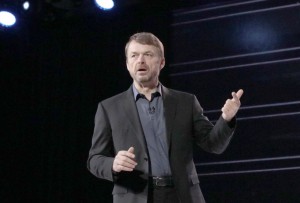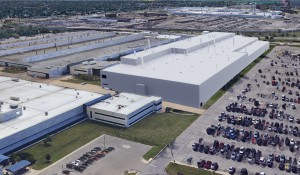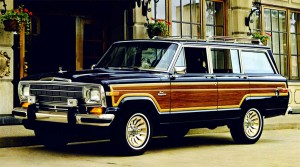
FCA CEO Mike Manley revealed the company will invest $4.5 billion in a new plant and upgrades to others to develop two new "white space" Jeeps and other vehicles.
Fiat Chrysler Automobiles will invest $4.5 billion in a new plant and upgrades to five other factories, in the process creating about 6,500 new jobs.
The project will focus primarily on the fast-growing Jeep and Ram brands which will launch production of two new large SUVs at its Mack Avenue Engine Complex in Detroit. The Euro-American automaker also plans to increase its investment in electrified vehicles, an area where it has fallen well behind key competitors.
“Three years ago, FCA set a course to grow our profitability based on the strength of the Jeep and Ram brands by realigning our U.S. manufacturing operations,” said FCA Chief Executive Mike Manley. “Today’s announcement represents the next step in that strategy. It allows Jeep to enter two white space segments that offer significant margin opportunities and will enable new electrified Jeep products.”
Jeep and Ram have both introduced new “mild” hybrid models over the last 18 months. The new program will take things a step further, according to Manley, who said the plan is to add “at least four” new plug-in hybrids, while also giving the automaker “the flexibility to produce fully battery-electric vehicles.”
(FCA hourly employees getting $6K profit-sharing checks. Click Here for the story.)
The single biggest piece of Tuesday’s news centers around the Mack Avenue Engine Complex. Rumors of its reopening have been circulating for several months and though Manley didn’t identify the factory by name, he confirmed Jeep would add a new assembly plant during a media roundtable at the North American International Auto Show in Detroit last month.

FCA plans to spend $1.6 billion to get its now-closed Mack Avenue Plant on Detroit's East side ready to produce new Jeep vehicles.
That project will see a complete makeover of the facility, on Detroit’s East side, at a cost of $1.6 billion. About 3,850 jobs will be added when the factory re-opens. Construction will begin by mid-year, with the first of the two new models, a large, three-row model, to launch by late 2020. The second product, a three-row version of the familiar Jeep Grand Cherokee, will go into production during the first half of 2021, according to FCA.
Along with the new assembly plant, FCA plans to:
- Expand production capacity at the Jefferson North Assembly Plant in Detroit that currently produces the Jeep Grand Cherokee and Dodge Durango. In the process, 1,100 jobs will open up;
- Production also will expand at the Warren Truck Plant currently producing the “Classic” version of FCA’s Ram 1500 pickup. It will add production of two other large Jeep models, the Wagoneer and Grand Wagoneer. This will add 1,400 new jobs;
- There will be upgrades at two Detroit-area stamping plants, and some engine production will be moved out of the Mack Avenue complex.
All told, about 6,500 jobs will be added, FCA said in a statement announcing the plans.
Tuesday’s announcement allows Jeep and Ram to respond to strong demand for existing products, reflecting the overall shift from sedans and coupes to SUVs, CUVs and pickups, said Stephanie Brinley, principal auto analyst with IHS Markit.
(Click Here for more about FCA’s new benefit program to help with college tuition.)

Jeep plans to revise its one-time top-line model, the Wagoneer, in 2020, as part of this $4.5 billion plan.
The new, three-row models coming to Mack Avenue, along with the Wagoneer pair, “enables it to expand where it doesn’t currently have a presence.” But Brinley cautioned that the investment plan “does have some risk,” as Jeep will go up against some well-established large and full-size SUV competitors, such as the Chevrolet Suburban and Cadillac Escalade.
The news stands in sharp contrast to what has been happening at FCA’s two cross-town Detroit rivals. Last November, General Motors announced plans to close five factories, including three assembly plants, touching off a political firestorm. It has been trimming jobs since then, earlier this month eliminating about 4,000 spots through an involuntary separation program. Ford Motor Co. has been trimming jobs, as well, though most of the cuts have, so far, focused on overseas operations. But it is expected to trim even more in the months ahead as part of an $11 billion restructuring.
The FCA announcement covers not only production but a planned investment into electrified vehicle technologies. The automaker has been relatively slow to embrace battery propulsion, Manley’s predecessor, the late Sergio Marchionne, going so far as to encourage motorists not to buy the all-electric Fiat 500e because the company, he noted, lost over $10,000 for each one it sold.
The equation has improved somewhat with FCA’s first plug-in hybrid, the Chrysler Pacifica Hybrid minivan. The automaker is not only selling that people-mover to retail customers but also supplying it to Waymo, the Google spin-off, which is converting the Hybrid model to run autonomously for the Waymo One ride-sharing service.
The Jeep and Ram brands, meanwhile, now offer models with “mild” hybrid technology designed to not only improve fuel economy but also enhance both on- and off-road drivability.
As part of the new plan, FCA plans to launch plug-in hybrid versions of the trucks that will be produced at the Mack Avenue, Jefferson North and Warren Truck assembly plants. All-electric versions could follow.
The automaker needs to move on that front, said Brinley, if for no other reason than to meet increasingly stringent mileage and emissions standards.
Focusing the electrification plan on the Jeep and Ram brands has several potential advantages. For one thing, these are generally the least fuel-efficient models in the FCA line-up and have the most to gain from adding battery-based drive systems.
(For details about GM’s plans to lay off 4,000 workers, Click Here. )
Meanwhile, as the automaker has shown with the mild hybrid systems on its Jeep Wrangler and Ram 1500 models, it can use battery technology to enhance the capabilities the brands are known for, said Brinley.

